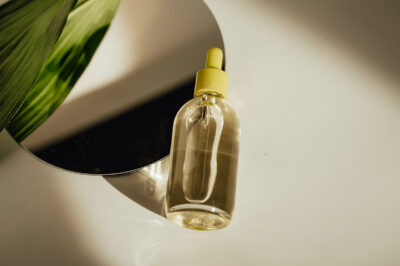Table of Contents[Hide][Show]
Vitamin C serum has gained popularity as an anti-aging skin care product that offers many skin-enhancing benefits including brightening, firming and protecting your skin. However, with so many vitamin C serums flooding the market, it can be overwhelming and difficult to know which one’s the right one for your unique skin type. In this article, we’ll explore the different types of vitamin C serums available and how to choose a vitamin C serum that is ideal for your skin type and concerns.
Types of Vitamin C Serum

There are several types of vitamin C serums that use different vitamin C derivatives, with each containing unique benefits and properties.
Here are some vitamin C forms and their effects that you may find in various vitamin C serums.
L-Ascorbic Acid
This is one of the most common types of vitamin C in serums and is almost synonymous with vitamin C—l-ascorbic acid. This form may be a bit harsh and irritating if you have a sensitive skin type or use acids in your skin care routine. L-ascorbic acid is water-soluble, easily oxidizing upon exposure to air and light, so it’s rather difficult to formulate for efficacy.
Ascorbic Acid Polypeptide
A synthetic vitamin C derivative, ascorbic acid polypeptide is water-soluble but more formula stable than l-ascorbic acid. Created through the combining of l-ascorbic acid and peptides, ascorbic acid polypeptide is used for a brightening effect on your skin.
Magnesium Ascorbyl Phosphate
Shelf-stable in skin care formulations, magnesium ascorbyl phosphate is used primarily for its hydrating effect on your skin. This vitamin C form is added to water-based products for a temporary soothing effect. However, the glow-giving properties are less strong in this derivative.
Sodium Ascorbyl Phosphate
For oily and sensitized skin types, sodium ascorbyl phosphate is a starting point for those looking to dip their toe into the world of vitamin C skin care, as it is very mild. You’ll find this ingredient in everything from shampoo to lipstick for its stability when exposed to air and light.
Tetrahexyldecyl Ascorbate
At Annmarie Skin Care, we are huge fans of tetrahexyldecyl-ascorbate (THDA) for its gentle yet highly effective quality. THDA is an oil-soluble vitamin C that makes it extremely stable while allowing optimal absorption through your skin. We love THDA for its brightening, firming and protecting effects on your skin. It’s also a more moisturizing vitamin C derivative and is great for dry and more mature skin types. Its optimal pH (5.5-7) allows it to be one of the market’s most non-irritating forms of vitamin C.
We include THDA in our popular, glow-inducing Wild Alchemy Collection, especially our Concentrated Boosting Elixirs. As a MADE SAFE® approved ingredient—the THDA we use is derived from glucose, a natural sugar obtained from non-genetically engineered vegetable starches.
We have another article that goes into detail about various types of vitamin C, should you want more in-depth information about this wonderful ingredient.
How To Choose a Vitamin C Serum That Suits Your Skin Type
When choosing a vitamin C serum, first determine your skin type and consider what your skin concerns are.
For normal, combination or oily skin types, a vitamin C derivative, like l-ascorbic acid, could be an option. Make sure that your vitamin C serum using l-ascorbic acid is packaged in an opaque glass bottle to ensure its stability and effectiveness.
If you have sensitive skin, you may opt for a serum formulated with vitamin C forms that are milder and less likely to irritate your skin. THDA is our favorite vitamin C form to use on the face, as we’ve found it to be highly absorbable and effective in brightening and moisturizing your skin, yet also very gentle. And, because it’s highly stable, it’s a great option for all skin types—and yes, that even includes those with slightly sensitive skin!
It’s also important to look for products that are formulated with other beneficial ingredients that align with your skin goals. Some serums may include additional hydrating, brightening, smoothing or firming agents that target the specific skin concerns you want to address. Using the right vitamin C form with these added ingredients will ensure your skin gets the maximum benefits when using a vitamin C serum in your skin care routine.
Who Should Use Vitamin C Serums?

Any skin type can benefit from vitamin C serums. However, the benefits of vitamin C serums for skin can be especially beneficial for dry, mature skin types and those with uneven skin tone, or looking to fade the look of dark spots. It’s a fantastic addition to any skin care collection, as vitamin C truly provides a wide range of skin benefits.
There are many different types of vitamin C serum available on the market, and you also have the option to DIY vitamin C at home. You don’t need to be confused or overwhelmed by all your choices! By considering your skin type and concerns and looking for products formulated with other beneficial ingredients, you can ensure that you choose the right vitamin C serum for your unique skin needs.
Frequently Asked Questions
Does vitamin C serum go bad?
Like most skin care products, vitamin C serum can go bad over time. The serum’s shelf life will vary depending on the formulation and storage. Products with a more easily oxidized form of vitamin C may go bad quicker than others that use a more stable form of vitamin C. Check the expiration date and discard the product if it has expired. Additionally, store your serum in a cool, dry place and keep the lid tightly closed to prevent oxidation.
Should I refrigerate vitamin C serum?
Refrigerating a vitamin C serum can help extend its shelf life. Cold temperatures slow the oxidation process, which causes your product to degrade over time. However, refrigeration can also cause the product to thicken, which may only be an issue if you have a particular preference for the feel upon application.
Does vitamin C serum cause pimples?
Vitamin C serum isn’t known to cause pimples. In many cases, vitamin C is a wonderful ally to oily skin types, especially for those experiencing clogged pores. But if you have sensitive skin, you may experience redness, itching or irritation with certain vitamin C forms, so be sure to use a product with a vitamin C your skin tolerates. Remember to patch-test the product before applying it to your face and discontinue use if you experience any adverse reactions.
Should I use 10% or 20% vitamin C serum?
You may be wondering, “What percent vitamin C is best?”—the concentration of vitamin C that’s best for your skin varies depending on your skin type and concerns. For those new to vitamin C, we recommend starting with a lower concentration and gradually increasing to a higher concentration. For sensitive skin, it’s best to use a lower concentration of vitamin C or consult a dermatologist for advice. Always do a patch test on your skin before applying it to your face.








Leave a Reply